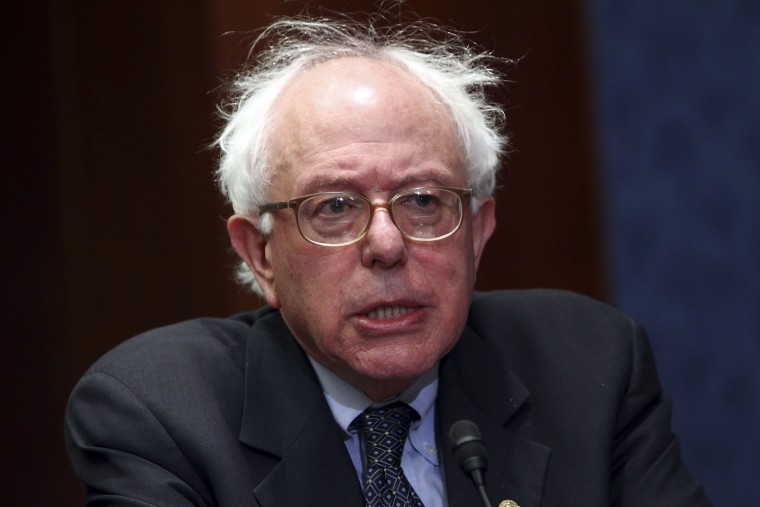The liberals' longtime dream of a government-run health care system for all died Wednesday in the Senate, but Sen. Bernie Sanders of Vermont vowed it will return when the realization dawns that private insurance companies "are no longer needed."
Sanders, an independent and socialist, said his approach is the only one "which eliminates the hundreds of billions of dollars in waste, administrative costs, bureaucracy and profiteering that is engendered by the private insurance companies." His remarks drew handshakes and even a hug or two from Democrats who had filed into the Senate to hear him.
Sanders acknowledged the proposal lacked the votes to pass, and he chose to withdraw it after Sen. Tom Coburn, R-Okla., exercised his prerogative and required Senate clerks to begin reading the 767-page proposal aloud to a nearly empty chamber. After three hours, they were 139 pages into it.
The political theater came as the White House and Senate Democrats sought an agreement with Sen. Ben Nelson, D-Neb., to become the 60th supporter of President Barack Obama's health care overhaul — the number needed to overcome a Republican filibuster.
The Nebraska lawmaker told reporters he was reviewing a proposal to toughen abortion restrictions in the legislation, one of the changes he is seeking. Nelson said the compromise negotiated by anti-abortion Sen. Bob Casey, D-Pa., involves attempt to separate private and public funds, an approach that in the past failed to sway the Nebraska moderate and Catholic bishops.
Asked whether the new language was satisfactory, Nelson said, "I don't know at this point in time. Constituency groups haven't responded back yet."
Nelson emerged as the lone known holdout among 60 Democrats and independents earlier in the week after Sen. Joe Lieberman, I-Conn., forced supporters of the bill to remove a proposed Medicare expansion.
Democratic officials also disclosed that Nelson's Nebraska-based chief of staff, Tim Becker, met with White House officials to put the final touches on recent negotiations between his boss and the president. Nelson's chief concerns deal with issues in Nebraska that are unrelated to the health care bill, said an official with close ties to the senator. The official spoke on grounds of anonymity to discuss private conversations.
In general, the overall legislation is designed to spread coverage to millions who lack it, ban insurance industry practices such as denying coverage because of pre-existing medical conditions and slow the rate of growth for medical spending nationally.
Republicans are unanimously opposed, and accuse Democrats of seeking deep cuts in Medicare and higher taxes to create a new benefit program that they argue gives government too large a role in the health care system.
The debate over the proper role for the government has bedeviled the issue from the outset.
At the behest of liberal Democrats, the House bill establishes a nationwide government-run insurance option in hopes of creating competition for private insurers.
In the Senate, moderates refused to support anything similar, with Nelson balking even at standby authority for the government in case efforts failed in their attempt to entice private companies to become more competitive.
Instead, the Senate measure is likely to call for development of nonprofit private plans to be overseen by the Office of Personnel Management, the agency that supervises the system that federal employees and lawmakers use to get coverage.
Sanders referred to his proposal as a "Medicare for all single-payer bill" and said if it became law, patients would be able to see the same doctors they now use. In his speech, he ripped into insurance companies, drugmakers, medical device manufacturers and others.
In order to provide cost-effective comprehensive health care, he said, "you're going to have to take on the private insurance companies and tell them very clearly they are no longer needed. Thanks for your service. We don't need you anymore."
Sanders later said he was not yet ready to say he would vote for the legislation Senate Majority Leader Harry Reid is drafting. Democrats are counting on him as one of the 60 votes they need, and have not betrayed any nervousness in recent days about his intentions.
The House already has approved its version of the health care bill, and Speaker Nancy Pelosi, D-Calif., said Wednesday she was confident a final compromise would be signed into law before Obama's 2010 State of the Union address.
She signaled a willingness to look at the proposal in the Senate bill that takes the place of government-run insurance in the House bill.
Asked whether she could support a final bill without a so-called public option, she said, "it depends what else is in the bill."
